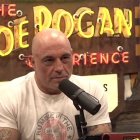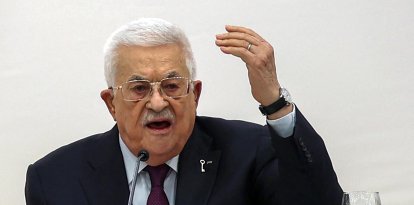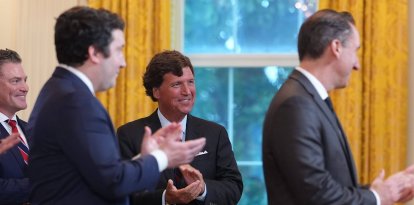Rogan vs. Murray, the digital right's civil war
The civil war unleashed within the right wing between Murray and Rogan is a relevant event because it involves two positions that for too long feigned insanity over the differences that sooner or later were going to pit them against each other.

Joe Rogan Experience #2303
A resounding, but not unexpected, controversy has opened up within the planet of the right's most iconic influencers (lumping podcasters, journalists, intellectuals and assorted opinionators into that set). Beyond the spicy juncture, the controversy has revealed the deep differences within a family that perhaps remained united only for convenience.
It so happened that Douglas Murray was recently invited to the Joe Rogan Experience, America's most successful podcast, where guests speak for hours to millions of listeners. In theory he went to promote his latest book On Democracies and Death Cults: Israel and the Future of Civilization, but a rough discussion diverted all attention. Rogan also invited another podcaster, the humorist and fiery denigrator of the State of Israel, Dave Smith, to the program. The aim was for both Douglas and Dave to confront their views on the Gaza and Ukraine wars.
Much of the conversation Murray had to devote to disproving the fairground prejudices that Smith spouts on a daily basis, with arguments traced from the narrative of the radical anti-Western, pro-Islamist left. The same slogans wielded by Greta Thunberg and Bernie Sanders, but presented from a simulated isolationist asepsis. This ideological communion with Wokism is what in the political ecosystem has come to be called the right-wing woke.
During the podcast Murray managed, loosely, to dismantle Smith's superficial nonsense, assembled in the corridors of Al Jazeera, but at a certain point temperance deserted him... and in the face of bullies he who gets angry, loses. It is at this point that he began to question Smith's authority to speak of what he clearly did not know and to expose his propensity for moral relativism that leads him systematically to establish an ethical equivalence between the United States and all the totalitarian regimes of the world.
"Smith sought nothing but provocation at any cost...and he succeeded."
The atmosphere quickly heated up as Murray, incisive, asked Rogan if there wasn't a disproportion and bias in favor of the anti-Ukraine and anti-Israel guests on his show and noted his tendency to invite them, to sustain such biases, "people who have appointed themselves experts who are not experts" to talk about history or geopolitics. In fact, Murray seemed to suggest, in questioning Smith's presence, that Rogan was leveraging Dave Smith to do the dirty work during his episode that Rogan dared not face, shielded by his role as host.
Murray questioned Rogan on whether this attitude was a good idea and, although he did not argue against freedom of speech, he criticized the position of these characters who raise the ruse of "just asking questions," with which they spread blood libels, black legends, lies about historical data and narratives born from the power plants of Qatar and Iran. It is a position that abhors conspiracism by default, for the sake of conspiracy itself. Murray argued that the audience should take such opinions with a grain of salt since they are not based on evidence, expertise or hard data.
At this point, it is clear that this group of very famous digital right influencers, who have long been fighting in the same trench, have avoided accepting that they have little in common outside of that trench. They have dodged looking at themselves, preferring to feign dementia about who they are and what their former comrades in the cultural struggle really think. This is the only way to explain why Murray (or people like Jordan Peterson and Gad Saad) still goes on Rogan's show.
In defense of 'non-experts'
The Joe Rogan Experience exhibits a very particular criteria in choosing the voices and topics for each episode, and Murray is very perceptive in detecting the underlying currents in certain sectors of the right wing that play on the edge of mystical delirium and Nazi apologia, and of a certain paranoid nihilism bordering on the anti-establishment of the 1968 era. The reason Smith and others disguise woke arguments as the revealed truth of the right is to end up converging both currents, left and right woke, toward anti-Western illiberal dogma.
The evidence assists Murray, in particular there are two Rogan guests who have generated criticism and controversy, Darryl Cooper and Ian Carroll, about whom it is worth paying attention: Cooper is a narrator, opinator who argues that Churchill was the villain of World War II and that Hitler wanted peace. Carroll is a YouTuber who propagates various anti-Semitic theories by way of trolling and provocation. Smith's case is similar, he is an anti-Israel propagandist who tries to disguise himself as anti-war. Incidentally, an anti-warism as childish as it is profoundly ignorant of the history and nature of war, a true caricature.
But Murray has spent a lot of time on war fronts and from that place of experience he staunchly defended Israel and criticized Smith for comparing Gaza to concentration camps. With such analogies, Smith was seeking nothing more than provocation at any cost... and he succeeded. Rogan, in turn, admitted that his guests might have biases and ignore the depth of what they were talking about, but rejected the idea that he should limit who he invites, stating that his goal is to explore diverse ideas, even if they come from controversial figures or eccentric people, not necessarily experts.
"To suggest that only authoritative arguments are valid is nonsense, much more so after the use and abuse that has been made of the expert figure."
Smith and Rogan are right to defend the fact that this new public square, which is the podcast format, serves to say anything and that non-experts have the right to give their opinion on political issues without needing an academic degree. They had further achieved their goal, to anger Murray and attack his argument which they labeled a "non-argument." Rogan seemed to align himself with Smith in this exchange, becoming annoyed when Murray expressed bewilderment that Smith had become a prominent voice in the debate over the Gaza war without ever having visited the Middle East.
And while Murray is right that Smith could become better informed by knowing the region he speaks on so regularly, he made two serious mistakes: suggesting that certain people shouldn't talk about certain things and that there should be some hierarchy. Sure, it's a good idea to visit a place you write about, but it's not imperative to be in a scene to understand it, analyze it, and describe it. By the way, Murray has not been to Germany in 1939 and yet he can speak with knowledge of WWII. That is to say, just because Smith is an improviser does not make all people who have knowledge from vicarious experience the same.
Murray makes an even bigger mistake: believing that the podcast world is driven by the pursuit of truth and that everyone is on the same page as he is. He lacks the understanding that the controversial opinions of self-perceived dissenting podcasters are simply sensationalist and stale narrative repackaged to fit the new format. The podcast is no different than any other medium, and the showbiz charlatans are there as much as anywhere else.
A new format with old vices: the stage of the right-wing civil war
Rogan has become a media giant who has built his empire by relying on controversy. Part of what has made it so popular is that it was an oasis during the Covid era, when the mainstream media clung to false dogma, totalitarian confinement, and censoring serious debate on theories of lab leaks or the dictatorship of health cards. Rogan allowed anti-establishment voices to speak for many uninterrupted hours.
Podcasts are a new agora, but they are still just an entertainment tool, with the same virtues and flaws as the defeated traditional media. Murray obfuscates in vain over the lack of accountability of mic-giving. This brings us to the broader point of his complaint: that in the podcasters' race for attention, the line between informing, opinionated and outrageous has been blurred. It is possible that in the format, devoid of the regulations of traditional media, lies an exacerbated and brutal performativity in which podcasters seek to break through, spilling out the most delusional views.
But Murray's attempt to dismiss these performances on the grounds that they do not coincide with "expert opinion" is an ineffective argument and, moreover, fails to do justice to his career by positioning him as a condescending credentialist. To suggest that only authoritative arguments are valid is nonsense, much more so after the use and abuse that has been made of the figure of the expert in the mass media and the crisis of institutional legitimacy that carats a veneer of distrust on everyone.
The problem is not that these places exist, but that informed (like Murray himself) and responsible people validate them with their presence.
Murray argued that the proliferation of podcasters without credentials is dumbing down public debates by prioritizing contrary opinions over verified facts. With that argument he stoked the fight in The New York Post in an article entitled So-called 'experts' on Israel-Hamas-Ukraine war spew false information on Joe Rogan podcast: there has to be a standard, denouncing the "conspiratorial" and one-sided voices that increasingly dominate the offering. For his part, Rogan also took it upon himself to further sting by using another crutch comedian to troll Murray, Tim Dillon, who mockingly imitated Murray. The opponents don't seem to want to quell the fire.

World
Joe Rogan says he feels "horror" because of the case of Venezuelan barber deported to El Salvador
Luis Francisco Orozco
Just on the next episode of Joe Rogan Experience the guest was Jordan Peterson, who, far from shying away from the debate, took the discussion of the right-wing woke into the realm of "political psychopathology." Peterson warned about the "psychopaths" who are taking over the right. Peterson expanded the debate around Rogan's role as a "gatekeeper" of the peripheries of public debate, giving air to "psychopathic monstrosities." Peterson's critique is this: the right woke exploits emotionality to gain power, adopting tactics of identitarianism and victimization similar to those of the left. But Peterson also misses things, because right-wing woke is not just a set of behaviors (such as bigotry or sensationalism), but a worldview and epistemological approach that prioritizes subjective narratives over facts, biases over data.
Journalism, academia and politics got, thanks to the digital revolution, a support that reduced the cost of a large television channel. But the podcast does not wash away manipulation, dishonesty or ignorance.
The civil war unleashed within the right wing between Murray and Rogan is a relevant event because it involves two positions that for too long feigned insanity over the differences that sooner or later were going to confront them. The stark reality is that Murray is a sophisticated writer, a risk-taking journalist and a staunch defender of the West, and Rogan makes a highly successful tabloid entertainment program, using human shields with fewer scruples than he does to spread his right-wing woke dogmas.
As bad as it may be for Murray, he will have to come to terms with the fact that the battles are different now, and that he and Rogan no longer share the same trench.
























